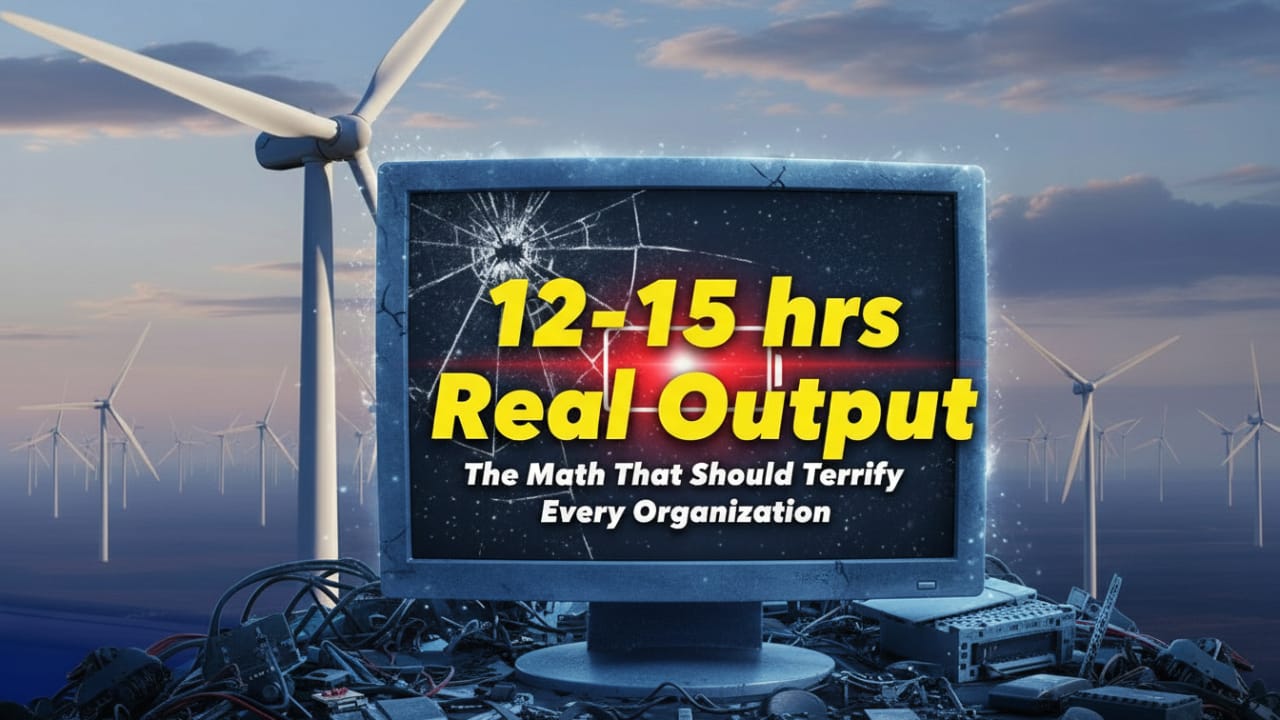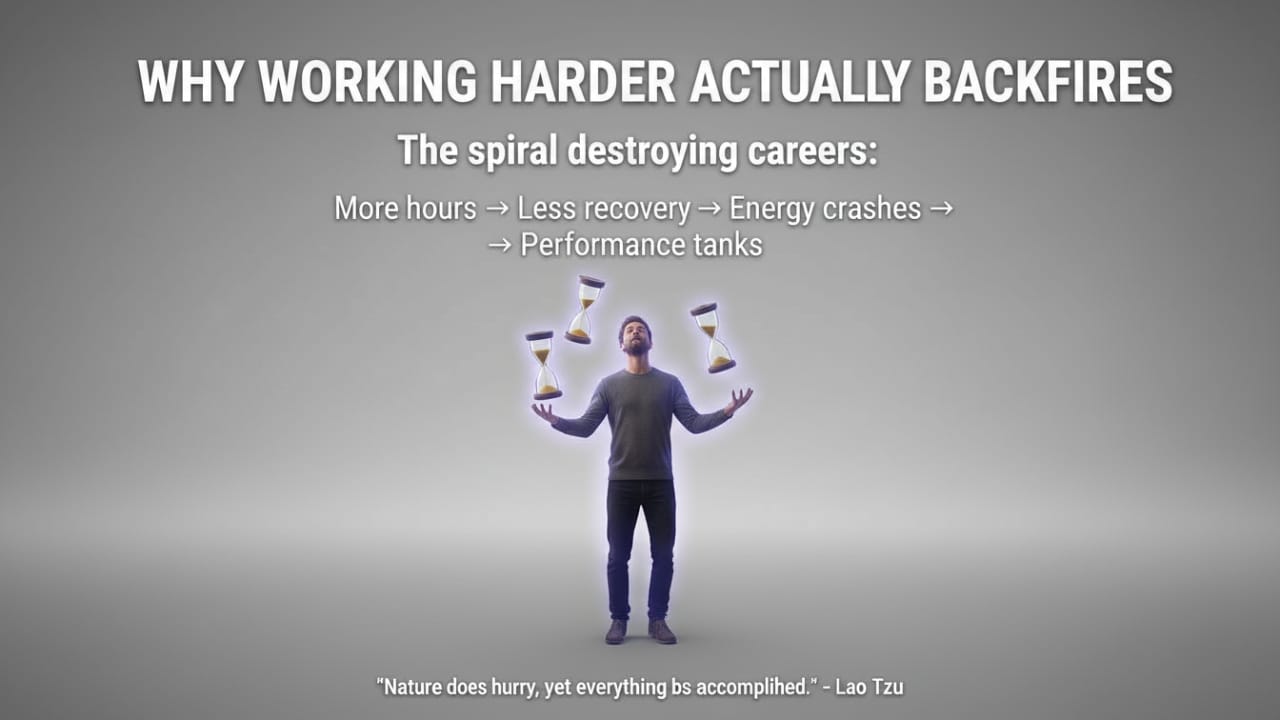- IVAN HUG
- Posts
- The Four Batteries You're Draining Right Now
The Four Batteries You're Draining Right Now
Manage your energy & not your time!
I observed many senior professionals across different industries in 30+ years. The ones getting promoted weren't working harder—they were managing something most people don't even track.
Picture two colleagues at a tech company. Tim and Maria.

Tim arrives at 7 AM, already feeling the familiar tightness in his shoulders. By 8 PM, he's sat through nine meetings, answered 143 emails, fielded 47 Slack notifications. At 6:45 PM, staring at a critical vendor decision, his mind feels like static. He makes the call anyway, defaulting to the familiar option because thinking through alternatives feels impossible.
Maria works 8:30 AM to 5:00 PM. Five focused blocks where her phone stays face-down. Three strategic meetings. Two major decisions before 11 AM—when her mind felt sharp, almost electric. Left energized enough to hit the gym, then actually enjoy dinner without checking email.
Maria accomplished more in 8.5 hours than Tim in 13.
The difference wasn't talent or discipline. It was energy.
And here's the ancient wisdom nobody's connecting to modern work: "You can't pour from an empty cup." Yet every productivity system assumes your cup magically refills itself while you pour continuously for 60 hours weekly.
Reflection Prompt: On a typical workday, which professional resonates more—Tim's exhausting grind or Maria's focused efficiency? What does that tell you about your current energy state?
If you've been successful for years but increasingly wonder "Is this sustainable?"—what follows will reframe everything you thought you knew about peak performance.
The Math That Doesn't Work
The average knowledge worker has 60 hours scheduled weekly. Research shows actual productive output? About 12-15 hours. The rest? Energy depletion masquerading as work.

You know that afternoon fog where you're staring at your screen, and despite being "at work" for seven hours, you've accomplished maybe one substantive thing. Your to-do list hasn't shrunk; it's metastasized. The knot of frustration in your gut tightens because you know you've been working—yet somehow, the meaningful work remains untouched.
Over three decades spanning consumer goods, aviation, banking, and tech, I've watched this pattern repeat: people work longer, accomplish less, wonder what went wrong.
Time is just a container. Energy is the fuel.
Here's what no one tells you about promotion velocity: The executives moving fastest aren't grinding longer—they're protecting three specific energy windows that most directors completely ignore.
The Three Hidden Batteries You're Draining

Battery #1: Your Decision-Making Capacity
You make approximately 35,000 decisions daily. From "Should I respond to this email now?" to "Which vendor should we choose?"—your brain treats every decision similarly. Each costs mental energy.
A major investment bank discovered brilliant senior leaders kept making questionable decisions in afternoon strategy sessions. The culprit? They'd burned through mental energy on 15 micro-decisions before meetings started. Approve expense reports. Choose meeting rooms. Select lunch options.
The bank moved critical decisions to morning-only sessions. Decision quality improved immediately—not because they hired smarter people, but because they stopped squandering finite mental energy on decision debris.
Battery #2: Your Attention Reservoir
UC Irvine research revealed that every context switch requires 23 minutes to fully recover focus. Think about your typical morning: Email. Slack. Meeting. Email again. Different project. Another meeting. Phone call.
You're not working efficiently. You're hemorrhaging energy through constant context switching.
"The man who chases two rabbits catches neither." Yet modern work demands you chase seven rabbits while answering Slack messages about three more.
One hour of genuine focus produces more than three hours of task-switching.
Battery #3: Your Emotional Reserves
Managing stakeholder expectations while hiding apprehension. Navigating office politics. Staying composed during difficult conversations. Projecting confidence when uncertainty gnaws at you.
During COVID, researchers studied two groups of nurses with identical workloads. Group A connected work to "saving lives and easing suffering." Group B viewed it as "getting through shifts."
Same hours. Same tasks. Group A sustained energy throughout the pandemic. Group B burned out within months.
Purpose fuels. Obligation drains.
Why Working Harder Backfires
Classic productivity advice assumes constant energy availability. That's biologically impossible.
Your energy fluctuates by the hour (90-120 minute ultradian cycles), by the day (recovery debt accumulates fast), and by task type (creating versus analyzing versus managing—each drains different cognitive systems).

Here's the vicious spiral: More hours worked → Less recovery → Lower energy per hour → Need even more hours → Even less recovery → Energy crashes → Performance tanks → Push harder → Repeat.
A McKinsey study tracked teams working 70-hour weeks. Productivity collapsed by week two. When they introduced recovery protocols and cut hours to 50, output increased 30%.

Fewer hours. More output. That's biology meeting reality.
"Nature does not hurry, yet everything is accomplished." Elite athletes train 4-5 hours with laser focus, then deliberately recover for 19 hours. You work 10-12 hours with scattered focus, then "recover" by collapsing in front of Netflix while answering emails.
What I'm about to share applies whether you're questioning your entire career direction or simply seeking renewed energy for the path you're already on.
The 2025 Wake-Up Call
DHR Global: 82% of workers are at risk of burnout. Gen Z and Millennials hit peak burnout at age 25—17 years earlier than the previous average of 42.

Gallup's 2025 report: Global employee engagement dropped to just 21%. Meanwhile, 34% of workers accepted lower-paying jobs to protect their mental health. Another 22% quit without having another job lined up.
People are literally walking away from money to escape exhaustion.
Burnout drains $322 billion annually through lost productivity, turnover, and healthcare expenses. That's not counting relationships damaged, potential unrealized, lives disrupted.
The Four-Battery Framework
You've been optimizing the wrong variable. Time management assumes all hours are equal, more input yields more output, and rest is optional. All false.

Energy management recognizes:
You have four distinct batteries: Physical, Mental, Emotional, and Purpose
Each recharges through specific, different mechanisms
Strategic energy allocation beats time allocation every time
Your Energy Diagnostic—Starting Now
Tomorrow morning, before opening your laptop, rate your energy level 1-10. Check again every two hours throughout your workday.

Track these four metrics daily for one week:
Energy Level (1-10 scale, every 2 hours)
Decision Count (major decisions morning vs. afternoon)
Context Switches (tally marks each shift between work types)
Purpose Moments (when work felt meaningful vs. obligatory)
By Friday, you'll discover patterns like:
Your strategic thinking window is 9-11 AM, but you schedule email triage then
That 2 PM meeting invariably crashes your afternoon energy
Back-to-back video calls with certain stakeholders drain you faster than hours of deep work
This simple tracking exercise reveals more about your productivity than any time-management course ever could.
Whether you're seeking renewed purpose after years of success, accelerating toward your next promotion, or designing a career that honors both ambition and life—the energy framework adapts to your specific stage.
Three Career Stages Where This Matters Most
Accomplished Drifter (10+ years): You're successful but unfulfilled. Manager engagement dropped to 27% globally. You're burning 60 hours weekly wondering why nothing feels meaningful. The problem isn't more hours—it's energy allocation away from what actually feeds you.
Growth Seeker (ambitious): Remote workers face 3.9% promotion rates versus 5.6% for in-office peers. That 3 PM strategic presentation? You've already burned your mental fuel on morning email triage. Your advancement isn't blocked by talent—it's blocked by energy mismanagement.
Balance Master (life integration): You want flexibility, but 81% of you check emails after hours. The flexibility you're fighting for becomes a trap when you don't protect your energy batteries. You removed physical boundaries but didn't replace them with energetic ones.
The Fork In The Road
Tim eventually burned out. Three months medical leave. Returned to a different, less demanding role. His career ended with exhausted whimpers, relationships strained, professional identity eroded.
Maria just got promoted. She's managing a team and teaching them her energy management approach. Her division has the lowest turnover and highest output. She sleeps well. She has energy for life outside work.
Time is democracy—everyone gets 24 hours. Energy is meritocracy—those who manage it better win.
Which path are you on?
Here's the moment where reading transforms into action. What you do in the next 7 days will determine whether this article becomes another "interesting read" or the turning point you look back on years from now.
The Six-Article Journey Ahead
This is Article 1 of 6, creating a complete system for sustainable high performance:
Article 2: Map your four energy batteries—Physical, Mental, Emotional, Purpose—and exactly how to recharge each.
Article 3: Eliminate decision waste. Cut that 35,000-decision day to what matters.
Article 4: Work with your biological rhythms. Same hours, triple the output.
Article 5: Master strategic recovery protocols that build capacity, not just prevent collapse.
Article 6: Connect everything to purpose—the renewable energy source that separates decades-long excellence from burnout.
The Paradigm Shift
Your calendar is theater. Your energy is reality.
While competitors optimize calendars by cramming more into every hour, you can optimize capacity by strategically allocating limited energy to highest-value activities. While they burn 70-hour weeks producing mediocrity, you can work strategically and produce excellence while actually sleeping well.
The competitive advantage isn't time—it's energy allocation.
Which path are you on? Tim's 13-hour grind toward burnout? Or Maria's 8.5-hour strategic allocation toward promotion, impact, and sustainable success?
You don't need more time. You need to multiply your usable energy.
And that multiplication doesn't require superhuman discipline. It requires understanding biological reality and working with it rather than against it.
The professionals who start tracking tomorrow will have actionable data by Friday. The ones who wait for the "right time" will still be exhausted six months from now, wondering why nothing changed.
Your immediate action: Before bed tonight, set your phone alarm for tomorrow morning: "Rate my energy 1-10 before opening laptop." One measurement. Start tracking.
You've spent years optimizing time. Give yourself one week to understand energy.
The data will surprise you. The insights will liberate you. The changes will compound.
This is Article 1 of 6 in The Energy Management Revolution series. Subscribe to receive the next article—you'll want the complete framework customized for your career stage.
Final Reflection: What's the primary emotion you're experiencing? Relief at understanding why productivity advice hasn't worked? Anxiety about implementing changes? Ambition sparked by possibility? That emotion itself is data—it tells you which energy battery needs attention first.